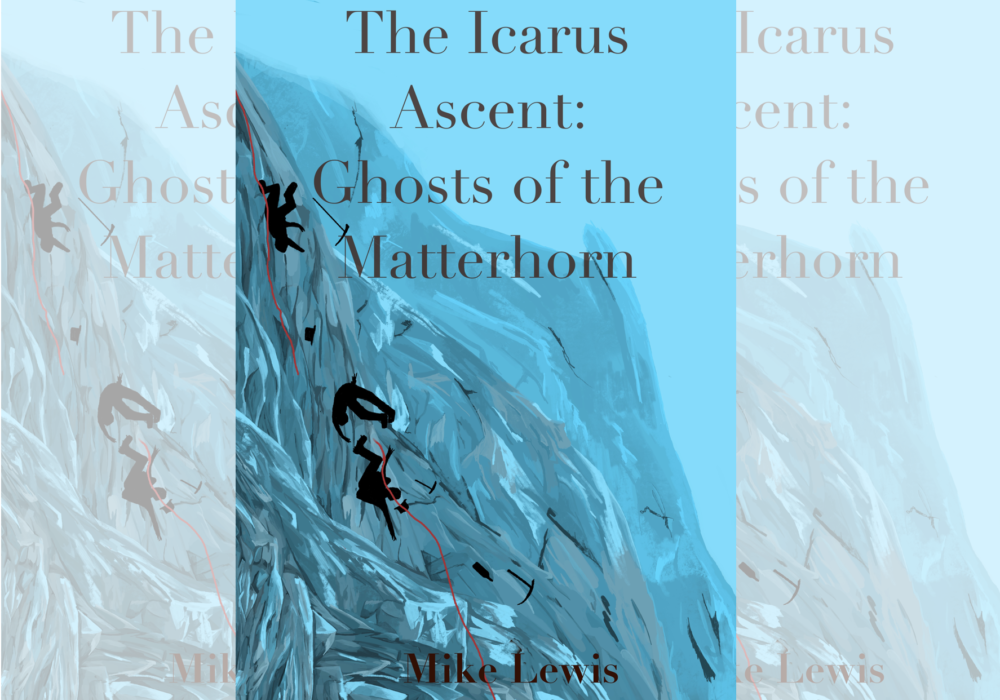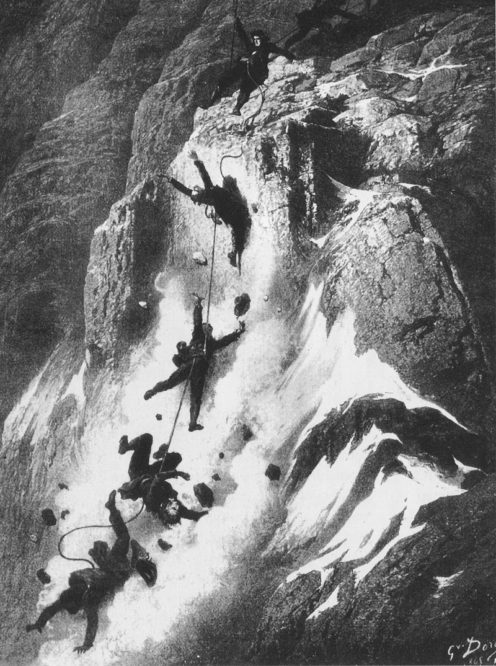Book review: The Icarus Ascent by Mike Lewis

Sarah Tanburn
On 14 July 1865 seven men reached the summit of the Matterhorn, that unique crooked peak standing isolated and exposed on the French/Swiss border. They were the first ever to climb the mountain, which is still one of the most intimidating challenges in the Alp.
Only three returned to Zermatt the following day.
The expedition had been hastily cobbled together by two English mountaineers, the famous Edward Whymper, whose life ambition it was to be first, and Charles Hudson, a very experienced Anglican chaplain. They were determined to uphold national and personal glory by defeating an Italian expedition taking another route.
There were two other Englishmen in the group. One, Lord Francis Douglas, was an amateur with several major climbs to him name. (His older brother was that Marquis of Queensbury who brought down Oscar Wilde.) The other, a nineteen-year-old travelling with Hudson, was the complete novice Douglas Hadow.
With them they had three local guides, well known to Whymer and Hudson. Michel Croz was at the peak of his great abilities as a guide. Swiss climber Peter Taugwalder was slightly older with vast experience, while his son, young Peter, was very skilled.
The men took a new route up the north-east face and found it much easier than anticipated – though still far from straightforward. In an hour on the summit, they built a cairn, left a bottle with their names in, danced about with excitement and contemplated the extraordinary view, stretching over 130 miles. Then they left, aiming to be across the ice-slippery traverse to the safety of the ridge below well before dark.
The Inquiry concluded that young Hadow had slipped and the rope holding him to Croz, Hudson and Douglas broke in mid-air under their weight. Three of their bodies, badly broken and stripped by the fall, were recovered, but Lord Douglas has never been found. Mike Lewis is not so sure. His new book, The Icarus Ascent, explores the adventure through the minds of the seven men, and leaves us wiser but no more certain.
Haunted
Each section of the book tells the story form the point of view of the one the climbers. It opens with the gruff Whymper, a single minded obsessive haunted by the tragedy, not least because it has destroyed his great triumph. He epitomises the nationalism of the time, the unyielding English superiority driven by the need to ensure that as much as possible of the globe is in some way claimed from the Crown.
Having heard his version, we can compare it with the other six, each of whom brings his own hopes and fears to the climb.
A few yearn for the softness of the woman (or women) awaiting them below. Some think of their children. Knowing what will happen, their reveries are tinged with sadness, but Lewis does an admirable job of resisting foreshadowing or letting their voices become ghostly and omniscient.
Many of them left letters and books from which he has pieced together their thoughts, and which give each of them a distinct tone. The voice of Hadow rings especially true.
The young, bullied boy is determined to succeed where everyone before has called him a failure, his wish for the ultimate comeback overcoming his terror of the ice, inadequate footwear and acknowledged ignorance.
From each angle Lewis ponders the mystery of the rope Whymper cut on the ascent, Hudson’s enthusiastic support for the untried Hadow, the dispatch of the youngest Taugwalder back to Zermatt. He describes their exultation at finding the ridge so much easier than anticipated and the capering glee of the dour Croz and Whymper on finding pristine snow on the summit p.
Each man has his thoughts on the other climbers, and whilst national glory is important there is no doubt they are all profoundly interested in their reputations and the stories which will be told about them. The three survivors talk of the rejection, lost work and endless suspicion they have endured instead.

Visionary
There is an argument that women write differently about climbing mountains than men. Robert Macfarlane cites the visionary work of Nan Shepherd who saw walking her native Cairngorms as a pilgrimage rather than a quest, who studied the smallest quirks and dips rather than rushed to the top and back.
True or not, this volume wholly captures the voice of men intent on conquest, their delight at virgin snowfields and unscaled cliffs. Whether they live to ponder the mystery or die on the descent, the men, even the professional guides who have lived all their lives at high altitudes, see the Matterhorn as some sort of enemy, and their victory over both it and all other climbers, to be celebrated.
One of the biggest problems for the expedition was unclear leadership. Whymper was temperamentally and by experience the man in charge. Croz was the guide and knew he was the best in the business, but, on this trip, Hudson was his employer. All three thought they always knew best and their compromises were not of the best.
The book highlights the importance of clarity about decision making in a dangerous situation: maybe Hadow would have reached the summit and all would have panned out the same. But maybe not, and the survivors would have been less tormented by events.
After all, as Whymper reminds us, Scott and his men all died in Antarctica yet their captain is lionised to this day. Cultural heroism is a strange and unpredictable phenomenon.
Fascinating
Lewis has created something ambitious in this book, to show seven different versions of the same conundrum without offering a definitive solution. It makes for a fascinating read for anyone interested in survival in extreme environments, and in the strange history of Alpinism at the apogee of Empire.
This is his second novel, the first, ‘If God Will Spare My Life’ being also a detailed reimagining of an historical event, that time one which begins in his native Pembrokeshire. I look forward to more.
I cannot close without a moment of mourning the loss of Victorina Press, whose imprint is on the book.
They have been an imaginative and energetic part of the book world. Like so many independent publishers, rising costs have made it impossible to continue. If you, as a reader can support small presses, independent bookshops and emerging writers, please do your best.
Given Victorina’s demise, this enjoyable and clever book can be bought directly from the author via [email protected].
Support our Nation today
For the price of a cup of coffee a month you can help us create an independent, not-for-profit, national news service for the people of Wales, by the people of Wales.





The biggest achievement in mountaineering is to come off the mountain alive, anything else is secondary. Having said this, mountaineering teaches us that life should be lived. You head up there, solo or with a climbing partner, then decide what your ability can achieve but make that decision thinking there is no one else on the planet to impress.
Compare this to the very sad elements of todays society, glued to fake reality TV, talent-less shows, everyone jumping on social media where attention seeking has been ramped up to adoration craving.